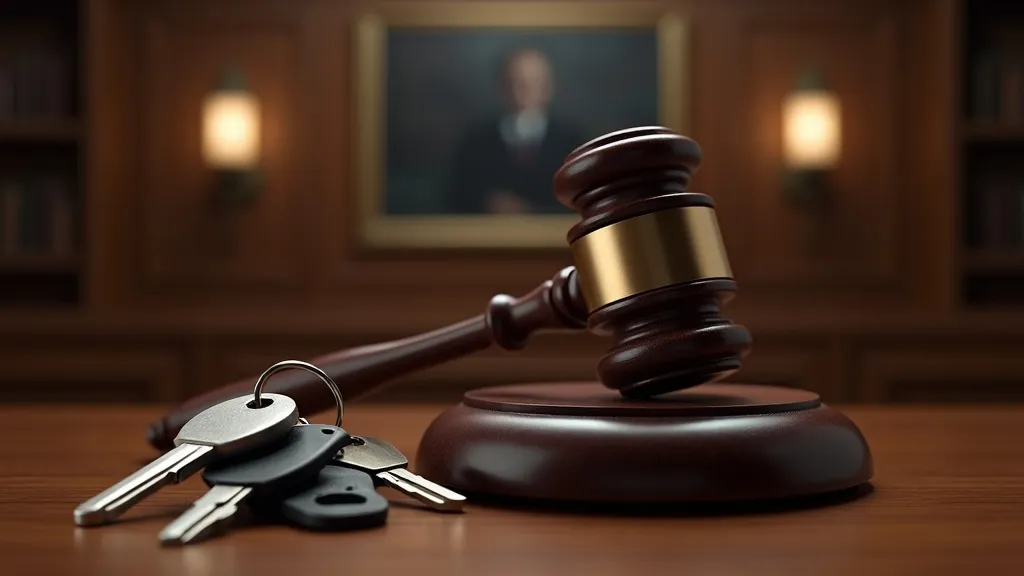Understanding Wrongful Repossession Claims
This guide delves into the complexities of wrongful repossession, a legal issue occurring when property is taken back without legal justification. Wrongful repossession can deeply affect individuals, leading to financial and emotional distress. This article explores the legal framework, common causes, and potential remedies for those affected by wrongful repossession, offering insights from legal experts.

Introduction to Wrongful Repossession
Wrongful repossession is a critical legal concern that arises when property, typically vehicles, is repossessed without proper legal authority. This process often leaves individuals in distress and confusion, unsure of their rights and the legality of the actions taken against them. As economic pressures mount, understanding the nuances of wrongful repossession becomes increasingly essential for consumers and financial institutions alike. The ramifications of wrongful repossession can extend beyond the immediate loss of property, affecting credit ratings, personal relationships, and overall financial health. Therefore, it is vital for individuals to be aware of their rights, the legal processes involved, and the potential for recourse when faced with such circumstances.
The Legal Framework of Repossession
Repossession is primarily a lender's right, typically outlined in a contract, to reclaim property if the borrower defaults on their payments. However, this right is bound by strict legal parameters that vary by jurisdiction. In many areas, a lender must adhere to specific regulations, including providing a notice of default and allowing a grace period before initiating repossession. The law generally mandates that the borrower must be informed of any impending repossession, and failure to comply with these stipulations can render the repossession wrongful.
Moreover, the legal framework may include consumer protection laws that provide additional safeguards against wrongful repossession. For instance, the Uniform Commercial Code (UCC) in the United States outlines the procedures lenders must follow to repossess goods. These rules aim to ensure fairness and transparency in the repossession process. Understanding these laws is essential for both borrowers and lenders to navigate the complexities of repossession effectively.
Common Causes of Wrongful Repossession
- Lack of Proper Notice: Repossession without prior notice or during a dispute over payment status can be deemed unlawful. Many jurisdictions require that lenders provide written notice detailing the default and the actions that will be taken if the issue is not resolved.
- Violation of Peace: Using force or threats to reclaim property is illegal and constitutes wrongful repossession. This includes entering a property without permission or using intimidation tactics to recover assets.
- Incorrect Documentation: Mistakes or fraudulent entries in contract terms can lead to unauthorized repossession. For example, if the lender repossesses a vehicle based on an erroneous belief that payments are in default, this can be challenged legally.
- Failure to Adhere to State Laws: Each state has its own laws governing the repossession process. Lenders must be fully compliant with these regulations; otherwise, the repossession may be considered unlawful.
- Improper Repossession Timing: If a lender repossesses property before the borrower has had a chance to remedy a default situation, such as during an agreed-upon grace period, the repossession may be deemed wrongful.
- Discrimination: Cases have arisen where repossession actions were taken based on discriminatory practices, which can lead to wrongful repossession claims. Actions taken against individuals based on race, gender, or other protected characteristics are illegal and may result in legal consequences for the lender.
Potential Remedies for Affected Individuals
Victims of wrongful repossession have several avenues for recourse. Often, the first step is to contact the lender to dispute the repossession. If this does not resolve the issue, legal action may be necessary. Filing a lawsuit can potentially result in the return of the property, compensation for damages, or both. Many jurisdictions allow for the recovery of not only the property but also for additional damages such as loss of use, emotional distress, and any attorney's fees incurred during the legal proceedings.
In some cases, if the repossession is determined to be particularly egregious, punitive damages may also be available. These are meant to punish the lender for their unlawful actions and deter similar conduct in the future. It is essential for affected individuals to document all correspondence with the lender and retain any evidence that supports their claim, as this will be critical in any legal proceedings.
Steps to Take if You Are a Victim
- Review your contract to understand your rights and obligations. Familiarize yourself with the terms related to default and repossession.
- Contact the lender immediately to dispute the repossession. Communicate clearly and assertively, outlining your reasons for contesting the repossession.
- Gather evidence, such as notices and payment records, to support your case. Document any relevant communication with the lender, including dates and content of conversations.
- Consult a legal expert to explore your options and potential claims. A knowledgeable attorney can provide guidance on the best course of action and represent you in negotiations or court if necessary.
- Consider filing a complaint with consumer protection agencies. Organizations such as the Consumer Financial Protection Bureau (CFPB) or state attorney general offices can assist in addressing unlawful repossession practices.
- Stay informed about the repossession laws in your state. Understanding your rights can empower you to take action and advocate for yourself effectively.
Industry Expert Insights
Legal experts emphasize the importance of staying informed about one's rights in repossession scenarios. “Understanding the legal requirements and having clear documentation can prevent many wrongful repossession cases,” notes a seasoned attorney specializing in consumer rights. Additionally, financial literacy and proactive communication with lenders are crucial in mitigating repossession risks. Experts recommend maintaining open lines of communication with lenders, especially if financial difficulties arise. By discussing potential issues early on, borrowers may be able to negotiate payment plans or deferments that can prevent the need for repossession.
Furthermore, experts highlight the significance of regularly reviewing account statements and payment histories to ensure accuracy. Mistakes can happen, and being proactive in addressing any discrepancies can prevent misunderstandings that lead to wrongful repossession. In the age of digital transactions, maintaining electronic records of all payments, agreements, and communications is more manageable and can serve as essential evidence if disputes arise.
FAQs
- What constitutes a wrongful repossession? A wrongful repossession occurs when property is taken back without following legal procedures or violating the terms of the contract. This can include repossessions conducted without proper notice, repossessions based on inaccurate information, or actions taken in violation of consumer protection laws.
- Can I sue for wrongful repossession? Yes, if you can prove that the repossession was illegal or unjust, you may file a lawsuit to recover damages or the repossessed item. Legal claims can vary in complexity, so it is essential to seek legal counsel to evaluate your specific situation.
- How can I prevent wrongful repossession? Stay informed about your contract terms, maintain clear communication with creditors, and keep records of all payments and correspondences. Additionally, being proactive in addressing any potential payment issues with your lender can help avoid situations that may lead to repossession.
- What should I do if my property has been wrongfully repossessed? First, gather all relevant documentation and evidence. Contact the lender to dispute the repossession. If that does not resolve the issue, consult with a legal expert to discuss your options, which may include filing a lawsuit.
- Are there any time limits for pursuing a wrongful repossession claim? Yes, there are often time limits, known as statutes of limitations, for filing legal claims related to wrongful repossession. These limits vary by jurisdiction and the nature of the claim, so it is crucial to act quickly and seek legal advice to ensure your rights are protected.
Consequences of Wrongful Repossession
The consequences of wrongful repossession can be significant and far-reaching. Individuals may face immediate financial hardships, such as losing their primary mode of transportation, which can hinder their ability to work and fulfill daily responsibilities. The emotional toll can also be considerable, leading to feelings of anxiety, anger, and helplessness. The stress associated with wrongful repossession can impact personal relationships and overall mental health.
Additionally, a wrongful repossession can have long-term effects on an individual’s credit score and financial stability. A repossession is a negative mark on credit reports, and if it is deemed wrongful, it may require legal action to expunge the record. This process can be complicated and time-consuming, further exacerbating the individual's financial difficulties.
Furthermore, wrongful repossession can lead to legal battles that can be costly and lengthy. Individuals may find themselves in a protracted dispute with lenders, requiring time, resources, and legal representation. This ongoing conflict can add to the emotional and financial strain experienced by the affected parties.
Preventive Measures and Best Practices
To avoid the risk of wrongful repossession, individuals can take several proactive steps. First and foremost, it is crucial to understand the terms of any loan or financing agreement thoroughly. Familiarizing oneself with the specific conditions under which repossession may occur can empower borrowers to take action before any issues arise.
Maintaining open communication with lenders is essential, especially if financial difficulties are on the horizon. Many lenders offer assistance programs for borrowers experiencing hardship, including payment deferments or modified payment plans. By reaching out early, borrowers can often find solutions that prevent default and subsequent repossession.
Keeping detailed records of all transactions, communications, and agreements with lenders is another critical practice. This documentation creates a clear history of compliance with contract terms and can serve as valuable evidence in case of disputes. Regularly reviewing account statements for inaccuracies is also advisable to catch any errors before they escalate into more significant issues.
Finally, seeking financial education and support can be beneficial. Understanding personal finance, budgeting, and the implications of taking on debt can help individuals make informed decisions that minimize the risk of falling behind on payments and facing repossession.
Conclusion
Wrongful repossession is a serious matter that can significantly impact individuals' financial stability and peace of mind. By understanding the legal framework and knowing the steps to take when faced with this situation, consumers can better protect themselves and seek justice when necessary. Continuous dialogue with creditors and legal counsel can further shield against such occurrences, fostering an environment of transparency and trust in financial transactions. Moreover, adopting preventive measures and best practices can empower individuals to navigate their financial obligations with confidence, reducing the likelihood of encountering wrongful repossession in the future. By being informed and proactive, consumers can safeguard their rights and well-being in an increasingly complex financial landscape.
-
1

Explore Thrilling Adventures: Unveil the World's Very Exciting Travel Destinations
-
2

Unlock the Secrets to Maximize Your Kona SUV's Fuel Economy
-
3

Unlock the Highest Resale Profit: Expert Tips for Boosting Your Kona SUV's Value
-
4

Effortless Adaptation to Senior Apartment Living: Master the Transition with This Ultimate Strategy
-
5

Transform Your Senior Apartment into a Cozy and Charming Retreat: Personalized Touches to Make It Truly Home









